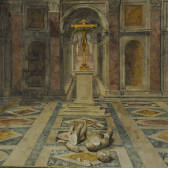EL GRAN DEBATE SOBRE LAS IMÁGENES
LA « MONARQUÍA CATÓLICA » Y SU IMPERIO ATLÁNTICO
En 2017 se celebra el V Centenario de un episodio fundamental en la historia de
Europa: la Reforma, iniciada por el monje agustino Martín Lutero, que cuestionaba
principios básicos de la Economía espiritual de la Iglesia Católica. Aunque la postura
de Lutero a la postre resultó moderada, no faltaron predicadores más radicales que
convirtieron las imágenes en uno de los verdaderos caballos de batalla de la Reforma,
generando un Gran debate sobre el sentido de las imágenes religiosas, sin cuya
existencia es imposible comprender el nacimiento de lo que llamamos Arte en la
primera Edad Moderna. España no fue ajena a este debate, ni su posición fue, como
se presenta en algunas ocasiones, inquebrantable y monolítica. Primero, porque una
parte de la batalla tuvo que darse dentro de sus fronteras —como prueban los archivos
de la Inquisición. Segundo, porque germinaron en su seno distintos movimientos
contrarios al uso de las imágenes (los alumbrados, sin ir más lejos) e incluso los
exportó fuera de sus fronteras (el Valdesianismo en Italia). Tercero, y último, porque
España era parte de una geografía mucho más amplia, fluida y compleja, que la de
la Península Ibérica: la Monarquía Católica.
El objetivo de este taller consiste en analizar estos tres aspectos fundamentales:
1) El Debate histórico y su relación con la historia de la Reforma
2) La geografía del problema
3) El nuevo discurso de un Arte reformado, Protestante lo mismo que Católico
..............................................................................
The year 2017 marks the Fifth Centenary of a fundamental event in the history of Europe:
the Reform, started at the initiative of the Augustinian monk Martin Luther, in which
he questioned some basic principles of the spiritual Economy of the Catholic Church.
Although Luther’s position eventually turned out to be moderate, there was no shortage
of more radical preachers who turned images into one of the key issues of the Reform
movement, generating a tremendous Debate on the value and meaning of images in
religious practice, without which it is impossible to understand the emergence of what
we call Art in the Early Modern Age. Spain did not stand aloof from this debate, nor was
its position immutable and monolithic as it is sometime portrayed. Firstly, because the
battle had to be waged in part within its own frontiers —as demonstrated by the records
of the Inquisition. Secondly, because various movements developed within Spain which
were contrary to the use of images (the alumbrados for instance), and even took root
across the Mediterranean (Valdesianismo in Italy). Thirdly and lastly, because Spain was
part of a geography that was much larger, more fluid and more complex than the Iberian
Peninsula, namely the Catholic Monarchy.
The aim of this workshop is to address these three fundamental aspects:
1) The historical debate and its relationship with the history of the Reform
2) The geography of the problem
3) The new discourse of a reformed Art, Protestant and Catholic alike
..............................................................................
CASA DE VELÁZQUEZ
Coordinación: Felipe PEREDA (Harvard University), María Cruz DE CARLOS VARONA
(Universidad Autónoma de Madrid), Nicolas MORALES (EHEHI, Casa de Velázquez)
Organización: École des hautes études hispaniques et ibériques (Casa de Velázquez, Madrid),
Harvard University, Universidad Autónoma de Madrid, Campus de Excelencia UAM-CSIC,
Ministerio de Educación, Cultura y Deporte, École française de Rome,
Telemme (UMR 7303 CNRS-Aix Marseille Université)
Colaboración: Biblioteca Nacional de España, Museo Nacional del Prado,
Patrimonio Nacional (Real Monasterio de San Lorenzo de El Escorial)
Mercedes García-Arenal, Yonatan Glazer-Eytan y Jesús Téllez Rubio participan en este taller.
